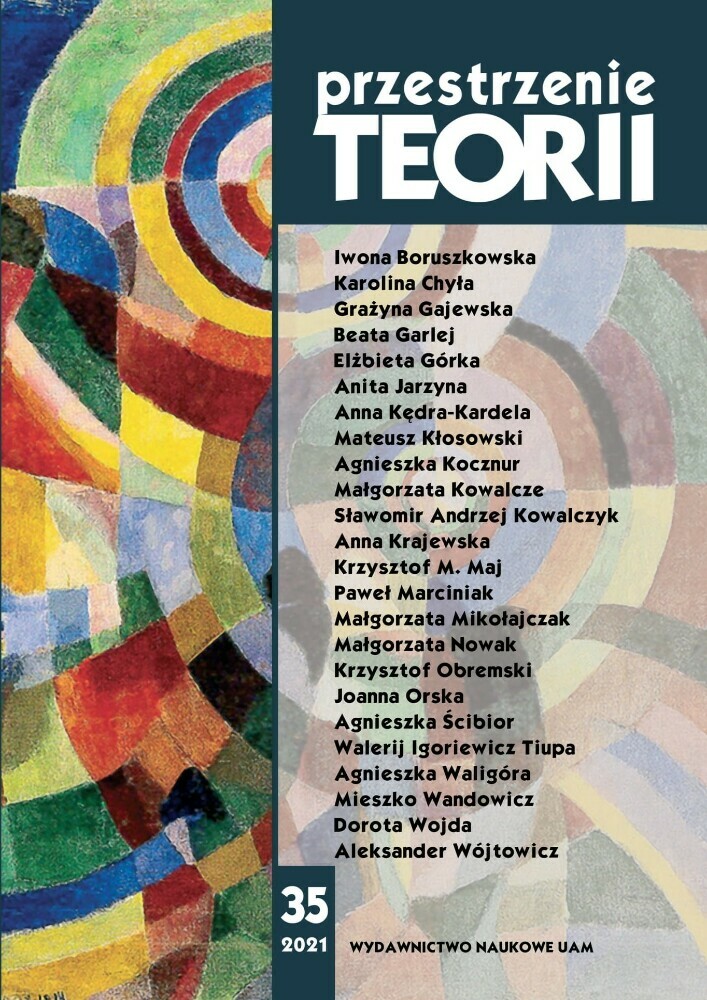Abstrakt
The article refers to the axiological paradigm of (dis)honesty (the notion taken from Tadeusz Kotarbiński’s analysis) capable of being one of the dedicated devices of the poetics of evocation. The point of reference for these theoretical reflections is Mark Twain’s short story entitled “The Man That Corrupted Hadleyburg”. The writer’s presentation of the still up-to-date and relevant axiological paradigm of (dis)honesty is at the hub of the deliberations,which aim to ascertain what constitutes the origin of its uniqueness and the freshness of its display. Primarily with the help of the concept taken from Roman Ingarden’s “catalogue” of aesthetically valuable qualities (“the ‘novelty’ variant”), and also drawing on the philosopher’s reflections devoted to one of the two ontological dimensions of the construction of a literary work (phaseality), an attempt is made to identify the specificity of the epically visualised phenomenon of (dis)honesty, and determine the methodological character of the poetics of evocation, necessary for this purpose.
Bibliografia
Basara-Lipiec E., Występowanie nazwy „arcydzieło” w polskich słownikach językowych, [w:] tejże, Arcydzieło. Teoria i rzeczywistość, Warszawa 1997, s. 19–24.
Caron J.E., The Arc of Mark Twain’s Satire, or Tom Sawyer the Moral Snag, „American Literary Realism” 2018, t. 51, nr 1, s. 36–58.
Delacroix E., Dzienniki. Część druga (1854–1863), tekst franc. oprac. A. Joubin, przeł. J. Guze, J. Hartwig, Gdańsk 2007.
Fizer J., Fazy Ingardena, „durée réelle” Bergsona, strumień Williama Jamesa. Metaforyczne warianty rozumienia czasu czy wykluczające się pojęcia czasu?, przeł. J. Hołówka, „Studia Filozoficzne” 1975, nr 10–11, s. 27–43.
Flaubert G., Pani Bovary. Z obyczajów prowincji, przekład i komentarze R. Engelking, Warszawa 2020.
Gadacz T., O zmienności życia, Warszawa 2013.
Garlej B., Poskramianie „spojrzenia złego” na przykładzie „Doktora Faustusa” Thomasa Manna i „Łaskawych” Jonathana Littella, „Przegląd Filozoficzny – Nowa Seria” 2020, nr 4, s. 423–435.
Garlej B., Warstwowość dzieła literackiego w ujęciu Romana Ingardena. Koncepcja, rozwinięcie, recepcja, Kraków 2015.
Głowiński M., Poetyka, [hasło w:] M. Głowiński, T. Kostkiewiczowa, A. Okopień-Sławińska, J. Sławiński, Słownik terminów literackich, red. J. Sławiński, Wrocław–Warszawa–Kraków 2000, s. 399–400.
Guzowska D., Ojciec purytanin. Ekspresja ojcowskich emocji w angielskich źródłach autobiograficznych epoki Stuartów, Warszawa 2020.
Humphrey R., Strumień świadomości – techniki, przeł. S. Amsterdamski, [w:] Studia z teorii literatury. Archiwum przekładów „Pamiętnika Literackiego” I, red. M. Głowiński, H. Markiewicz, Wrocław 1977, s. 225–251.
Ingarden R., O poznawaniu dzieła literackiego, przeł. D. Gierulanka, Warszawa 1976.
Ingarden R., Wykłady i dyskusje z estetyki, wyb. i oprac. A. Szczepańska, wstęp W. Stróżewski, Warszawa 1981.
Ingarden R., Wykłady z etyki, wybrał, opracował i wstępem poprzedził A. Węgrzecki, Warszawa 1989.
Kotarbiński T., Co robić, a czego nie robić?, [w:] tegoż, Medytacje o życiu godziwym, Warszawa 1985.
Kuczera-Chachulska B., „»W Tobie jest światłość«: szkice o liryce religijnej Oświecenia i romantyzmu”, Czesław Zgorzelski, Lublin 1993: [recenzja], „Pamiętnik Literacki” 1995, t. 86, nr 4, s. 134–140.
Makota J., Warstwa, [hasło w:] Słownik pojęć filozoficznych Romana Ingardena, red. nauk. A.J. Nowak, L. Sosnowski, Kraków 2001, s. 284–287.
Regulski A., Śniadanie u Sokratesa, Poznań 1982.
Sosnowski L., Roman Ingarden. Portret nauczyciela, [w:] Spotkania. Roman Ingarden we wspomnieniach, red. L. Sosnowski, Kraków 2020, s. 63–110.
Stawiński J., Mark Twain, Warszawa 1963.
Twain M., Człowiek, który zdemoralizował Hadleyburg, przeł. A. Słonimski, [w:] tegoż, Trzydzieści trzy opowieści, Warszawa 1973.
Woleński J., „…uważał siebie za depozytariusza prawdy filozoficznej…”, [w:] Spotkania. Roman Ingarden we wspomnieniach, red. L. Sosnowski, Kraków 2020, s. 313–339.
Zgoda L., „…Ingarden był mistrzem, ale wychowała nas Dąmbska…”, [w:] Spotkania. Roman Ingarden we wspomnieniach, red. L. Sosnowski, Kraków 2020, s. 359–374.
Licencja
Autorzy
Autorzy tekstów przyjętych do publikacji w czasopiśmie „Przestrzeniach Teorii” są zobowiązani do wypełnienia, podpisania i odesłania na adres redakcji umowy o udzielenie nieodpłatnej licencji do utworów, z zobowiązaniem do udzielania sublicencji CC.
Zgodnie z umową, autorzy tekstów opublikowanych w czasopiśmie „Przestrzeniach Teorii” udzielają Uniwersytetowi im. Adama Mickiewicza w Poznaniu niewyłącznej i nieodpłatnej licencji oraz zezwalą na użycie sublicencji Creative Commons Attribution-NonCommercial-NoDerivatives 4.0 International (CC BY-NC-ND 4.0).
Autorzy zachowują prawa do dalszego, swobodnego rozporządzania utworem.
Autorzy, którzy wykorzystują w swoim tekście cudze utwory (np. ilustracje, fotografie) proszeni są o dostarczenie do redakcji czasopisma zgodę na publikację od uprawnionych podmiotów.
Użytkownicy
Zainteresowani użytkownicy internetu uprawnieni są do korzystania z utworów opublikowanych po 2015 roku „Przestrzeniach Teorii” tylko w calach niekomercyjnych, pod następującymi warunkami:
- uznanie autorstwa - obowiązek podania wraz z rozpowszechnionym utworem, informacji, o autorstwie, tytule, źródle (odnośniki do oryginalnego utworu, DOI) oraz samej licencji;
- bez tworzenia utworów zależnych - utwór musi być zachowany w oryginalnej postaci, nie można bez zgody twórcy rozpowszechniać np. tłumaczeń, opracowań.
Do wszystkich tekstów opublikowanych przed 2015 r. prawa autorskie są zastrzeżone.
Inne
Uniwersytet im. Adama Mickiewicza w Poznaniu zachowuje prawo do czasopisma jako całości (układ, forma graficzna, tytuł, projekt okładki, logo itp.).

